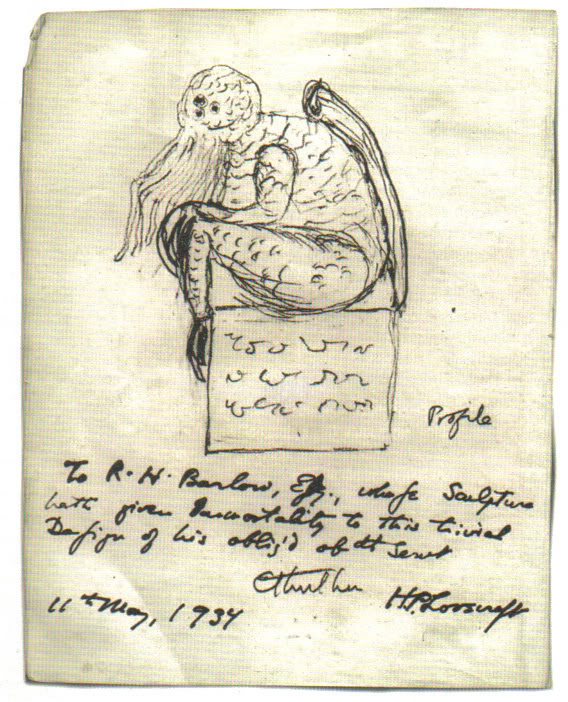
Longtime readers may know that I, like most sci-fi/fantasy enthusiasts, enjoy the works of of H.P. Lovecraft. Apart from his racial views–which are thankfully absent from most of his better stories–I like his writing, his evocative settings and memorable, unique monsters.
That said, his plots frequently aren’t as good as they could have been. The Shadow Out of Time needed to have the middle third edited out. The second half of The Whisperer in Darkness gives away a certain critical plot twist way too early. The Dunwich Horror is just bad. Ironically, though Lovecraft wrote critical essays and letters asking for subtlety in horror fiction, his own stories often failed do this, and would clumsily reveal too much detail about his creatures.
The Call of Cthulhu is probably his single most famous work. In fact, his Cthulhu creation may be more famous than he himself is, being a sort of shorthand for the ultimate evil in certain circles.
The problem is, Call of Cthulhu isn’t a very good horror story. Well, to be fair, the first two-thirds of it are. The opening paragraph is one of my favorite quotes in all literature. But then we have the last third… (I’m about to spoil the story, so be warned.)
Part of the problem of the last third of CoC is that the first two parts are so good. Lovecraft builds up to the horror gradually, hinting and letting his narrator–and by extension, the reader–glimpse and guess rather than just outright explaining what Cthulhu is. With all this weighing on his mind, we come to the the adventure of Second Mate Johansen.
The mere fact that anybody even found R’lyeh in the first place is a problem. It would have been better if its existence had only been guessed at–perhaps in “old legends telling of a weird island that has since vanished”, or something along similar lines. Having somebody actually find it eliminates a key element that is often underused in horror, but of which Lovecraft ought to have been cognizant: that is the element of uncertainty, of wondering if all the narrator’s suspicions might be merely incipient madness.
Even worse is the part where the sailors actually witness the awakening of Cthulhu. No matter how overwrought Lovecraft makes his prose, he can’t possibly make this monster live up to the hype he’s given it. So, it was a big dragon-squid, was it? That’s… somehow disappointing.
But the worst of all; the fatal flaw that almost ruins the story for me, is what happens next: the last surviving sailor makes it back to his ship and rams Cthulhu with it. And this actually forces Cthulhu to retreat!
This is just awful horror writing. This Elder-God, this unspeakably powerful, incomprehensibly awesome creature can be defeated by one guy with a boat? Why not just have the Navy station a battleship out there and repeat this every time the Great Old One becomes troublesome? Actually, that’s not even necessary, because it apparently only wakes every few “vigintillion” years anyway, which means Johansen probably has saved humanity for the rest of its existence. This is such a classic mistake, there’s even a page on TVTropes named for it: “Did You Just Punch Out Cthulhu?”
I think Lovecraft must have realized this was pretty weak, so he tried to imply at the end that the cultists (here are those blasted racial ideas of his creeping in) were going to sabotage all efforts at learning about the existence of Cthulhu or R’lyeh. But the problem with that is, the cultists are repeatedly shown to be incompetent throughout the story. Johansen and his crew-mates were able to defeat their sentry ship without even realizing what they were doing.
All in all, what an awful way to ruin a potentially terrifying monster! The lesson for aspiring writers: if you invent a Terrifying, Scary, Nearly Omnipotent Monster, don’t ruin it by letting it be defeated easily. And it’s best not to actually show it in action at all, but rather to just show hints of it.